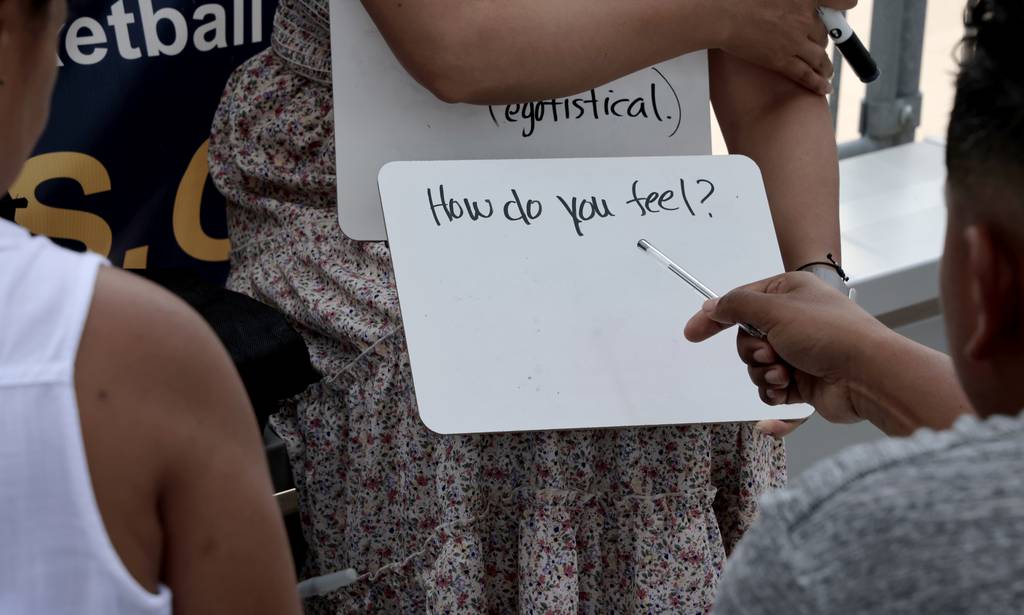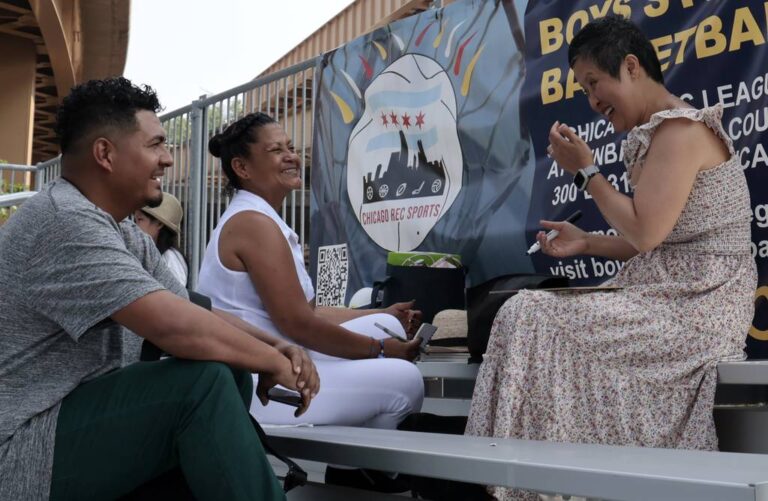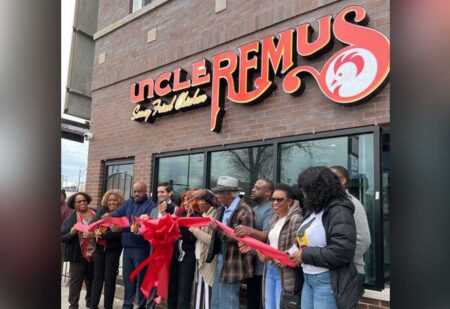There hasn’t been a single day since May that Samantha Oulavong is not thinking of the migrants who stay at the police station in her neighborhood in the South Loop. The children, she said, remind her of her younger self, when her parents made their way from Laos seeking asylum in the Chicago area when she was 5 years old.
Of course, in more than one way, their story is not the same, she said, “but our heart is.”
“They come to this country with a dream,” she said.
Oulavong has been visiting the 1st District police station almost every day since May, when the first families began to seek refuge at the station near her home. She drops off food and clothes and, most recently, has begun to teach basic English to the migrants and their children regardless of a language barrier — she doesn’t really speak Spanish — in the bleachers of a basketball court across from the South Loop station.
“Most want to know how they can ask for a job,” she said. “‘Busco trabajo,’ I tell them to say, meaning, ‘I’m looking for a job.’”
Oulavong is just one of the many Chicagoans who have stepped up to provide more than just food and donations for the thousands of asylum-seekers who have arrived to the city since August of last year, filling a void as state and city official grapple to create more temporary housing for the migrants.
The volunteers have celebrated birthdays with migrants, taken them to baseball games, given them haircuts, provided professional therapy — and now are teaching them English.
Right before 11 a.m. on a recent weekday, wearing a small summer hat and a long maxi dress, Oulavong walks over to the station to announce in broken Spanish that she is heading to the bleachers to begin the one-hour class.
In a white tote, she carries small notebooks and pencils to share with those who decide to be her students for the day. “¿Quieres aprender inglés?” she asks a young man who approached her as she held a white dry erase board.
Though she doesn’t know Spanish, she taught herself some words and phrases that she thinks are essential for the migrants to know as they navigate their days in the station. When Oulavong and her students hit a language barrier, they communicate through a translator application on her phone.
The lessons can attract anywhere from three to 10 migrants, depending on how many are staying in the station that day. The students sit on the bleachers adjacent to the basketball court at Margaret Hie Ding Lin Park, just as the sun shines the brightest. There are mornings when classes take place alongside the loud pinging sound of basketball games.
“I wish they could be my students forever,” Oulavong said softly with a light smile. When a group that had been at the station for more than two weeks got moved, she cried and hugged them goodbye.
“It’s bittersweet, I hope it gets better for them,” she said.
When they’re moved into shelters, she assures them that she will be at the court teaching every morning at least during summer break.
Oulavong is an art teacher by trade. She has been teaching at an Aurora middle school for 25 years. During most of her breaks, whether it be winter or summer break, she travels to developing countries to volunteer, teaching children art and photography, she said.
“At a very young age, I knew that education was the ticket for me to get out of poverty,” she said. Out of her four siblings in the Chicago area, she was the only one to attend and graduate college.
She said she wants to teach “because I believe in the power of education and I want to empower them (the migrants).”
Many of Oulavong’s asylum-seeking students are professionals, she said. There are accountants, nurses, attorneys and teachers, like her. But even if they wanted to practice, language barriers and a lack of work authorization prevent it. At least for now.
So every time she can she reminds them that it’s possible to make it: “Like my parents,” she tells them.
Her parents fled the war in Laos, a landlocked country bordered by China and Myanmar to the north and Vietnam to the east, in 1981, when she was 5 years old. The family arrived in Rockford where a family sponsored them, and eventually helped establish them in the country.
“My mom believed in the American dream so much that even garbage can be turned into gold,” she said with a smile, recalling how she and her mother used to go through trash cans on garbage days to look for aluminum cans to recycle. And on rainy days, they would dig for worms to sell to local fisheries.
Years later, “my mom bought her first house in cash because of the money that she made collecting cans.”
She likes to remind the asylum-seekers that the beginning may be harsh but “if you are willing to work hard, and you don’t care what kind of job you do, with dignity, you can survive here.”
Her parents, she recalled, had no education at all. They didn’t know how to read, even in their native language, and that made it much more difficult to find stability in the country, she said.
Language is empowering, she said, recalling the difficulties her family endured when arriving to the country without knowing a bit of English.
“A lot of them wanted a job and I told them they need to learn English first,” she said with a smile.
Research shows that learning English is vital to boosting asylum-seekers’ and refugees’ capacity to integrate into the new communities, as well as to pursue a better job or their previous occupation. Language is also important for better access to community resources.
And some of Oulavong’s students are learning — at least the basics for now.
There’s Karla Urbina, a mother from Nicaragua who lived at the station for nearly a month. She was one of Oulavong’s first students. Though she has been moved to a shelter in Rogers Park, she makes the nearly hourlong train and bus commute to the South Loop every so often to keep learning English with Oulavong.

“Karla is fearless,” Oulavong said. “Sometimes she translates for us,” she laughed.
Urbina, a social worker by trade in her home country, has become a part of the volunteer network that assists the families arriving at the 1st District police station, along with Brayan Lozano, an asylum-seeker from Colombia who also spent several weeks at the station.
Lozano, also a social worker and an organizer in his home country, often encourages his fellow migrants to learn English.
“That’s the next step if we really want to succeed here,” he said.
Both Urbina and Lozano have stayed diligent in their learning process, often meeting with Oulavong or other volunteers one on one. Though their English is very limited, they’re now able to communicate their needs and the needs of those arriving, Oulavong said.
Even though the two have become an essential part of the volunteer team assisting new arrivals in the South Loop, they believe that their roles could be amplified if they were to master the English language, by not only assisting volunteers, but even helping city officials.
“Imaginate que podriamos lograr,” said Urbina with a grin. “Just imagine what we could accomplish”
During a lesson last week, the two joined her class at the basketball courts. After that class, Oulavong was set to leave for vacation for a little over a week. The three, once strangers, hugged when they met each other and proceeded to take out their notebooks and pencils.
larodriguez@chicagotribune.com







